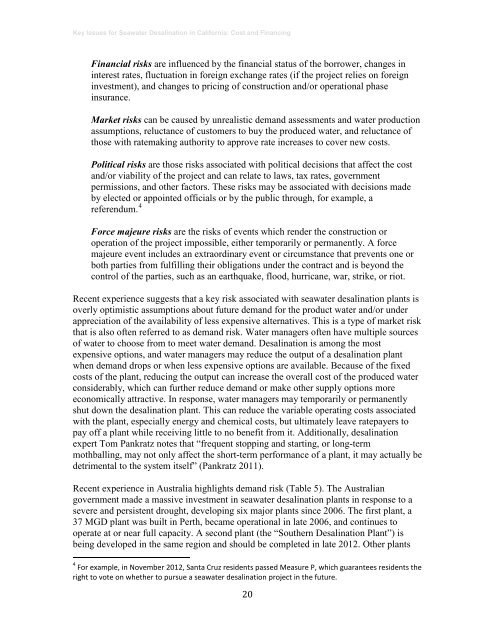997.4 KB - San Francisco Bay Area Independent Media Center
997.4 KB - San Francisco Bay Area Independent Media Center
997.4 KB - San Francisco Bay Area Independent Media Center
Create successful ePaper yourself
Turn your PDF publications into a flip-book with our unique Google optimized e-Paper software.
Key Issues for Seawater Desalination in California: Cost and Financing<br />
Financial risks are influenced by the financial status of the borrower, changes in<br />
interest rates, fluctuation in foreign exchange rates (if the project relies on foreign<br />
investment), and changes to pricing of construction and/or operational phase<br />
insurance.<br />
Market risks can be caused by unrealistic demand assessments and water production<br />
assumptions, reluctance of customers to buy the produced water, and reluctance of<br />
those with ratemaking authority to approve rate increases to cover new costs.<br />
Political risks are those risks associated with political decisions that affect the cost<br />
and/or viability of the project and can relate to laws, tax rates, government<br />
permissions, and other factors. These risks may be associated with decisions made<br />
by elected or appointed officials or by the public through, for example, a<br />
referendum. 4<br />
Force majeure risks are the risks of events which render the construction or<br />
operation of the project impossible, either temporarily or permanently. A force<br />
majeure event includes an extraordinary event or circumstance that prevents one or<br />
both parties from fulfilling their obligations under the contract and is beyond the<br />
control of the parties, such as an earthquake, flood, hurricane, war, strike, or riot.<br />
Recent experience suggests that a key risk associated with seawater desalination plants is<br />
overly optimistic assumptions about future demand for the product water and/or under<br />
appreciation of the availability of less expensive alternatives. This is a type of market risk<br />
that is also often referred to as demand risk. Water managers often have multiple sources<br />
of water to choose from to meet water demand. Desalination is among the most<br />
expensive options, and water managers may reduce the output of a desalination plant<br />
when demand drops or when less expensive options are available. Because of the fixed<br />
costs of the plant, reducing the output can increase the overall cost of the produced water<br />
considerably, which can further reduce demand or make other supply options more<br />
economically attractive. In response, water managers may temporarily or permanently<br />
shut down the desalination plant. This can reduce the variable operating costs associated<br />
with the plant, especially energy and chemical costs, but ultimately leave ratepayers to<br />
pay off a plant while receiving little to no benefit from it. Additionally, desalination<br />
expert Tom Pankratz notes that “frequent stopping and starting, or long-term<br />
mothballing, may not only affect the short-term performance of a plant, it may actually be<br />
detrimental to the system itself” (Pankratz 2011).<br />
Recent experience in Australia highlights demand risk (Table 5). The Australian<br />
government made a massive investment in seawater desalination plants in response to a<br />
severe and persistent drought, developing six major plants since 2006. The first plant, a<br />
37 MGD plant was built in Perth, became operational in late 2006, and continues to<br />
operate at or near full capacity. A second plant (the “Southern Desalination Plant”) is<br />
being developed in the same region and should be completed in late 2012. Other plants<br />
4 For example, in November 2012, <strong>San</strong>ta Cruz residents passed Measure P, which guarantees residents the<br />
right to vote on whether to pursue a seawater desalination project in the future.<br />
20
















